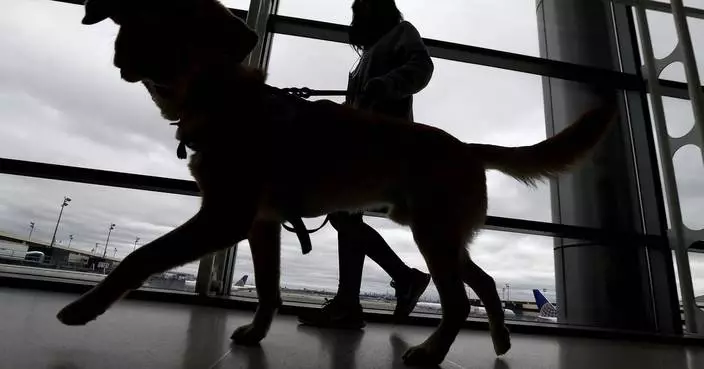The facial anatomy of dogs has changed from that of wolves during thousands of years of evolution.
Dogs have evolved their “sad eyes” facial expression in order to help them get on better with humans, according to new research.
Scientists at the University of Portsmouth carried out a study comparing the anatomy and behaviour of dogs and wolves.
Their results suggest that the facial structure of dogs has changed during thousands of years specifically to enable them to communicate with humans.
A university spokesman said: “Researchers found that the facial musculature of both species was similar, except above the eyes.
“Dogs have a small muscle, which allows them to intensely raise their inner eyebrow, which wolves do not.
“The authors suggest that the inner eyebrow-raising movement triggers a nurturing response in humans because it makes the dogs’ eyes appear larger, more infant-like and also resembles a movement humans produce when they are sad.
Psychologist Dr Juliane Kaminski, who led the research which is published in the American journal PNAS, said: “The evidence is compelling that dogs developed a muscle to raise the inner eyebrow after they were domesticated from wolves.
“We also studied dogs’ and wolves’ behaviour and, when exposed to a human for two minutes, dogs raised their inner eyebrows more and at higher intensities than wolves.
“The findings suggest that expressive eyebrows in dogs may be a result of humans’ unconscious preferences that influenced selection during domestication.
“When dogs make the movement, it seems to elicit a strong desire in humans to look after them.
“This would give dogs that move their eyebrows more a selection advantage over others and reinforce the ‘puppy dog eyes’ trait for future generations.”
Dr Kaminski’s previous research showed that dogs moved their eyebrows significantly more when humans were looking at them compared to when they were not looking at them.
Lead anatomist Professor Anne Burrows, at Duquesne University, Pittsburgh, USA, co-author of the paper, said: “To determine whether this eyebrow movement is a result of evolution, we compared the facial anatomy and behaviour of these two species and found the muscle that allows for the eyebrow raise in dogs was, in wolves, a scant, irregular cluster of fibres.
“The raised inner eyebrow movement in dogs is driven by a muscle which doesn’t consistently exist in their closest living relative, the wolf.
“This is a striking difference for species separated only 33,000 years ago and we think that the remarkably fast facial muscular changes can be directly linked to dogs’ enhanced social interaction with humans.”
The university spokesman said the only dog species in the study that did not have the muscle was the Siberian husky, which is among more ancient dog breeds.
WASHINGTON (AP) — Leaders of three large public school systems strongly denied allegations that they let antisemitism run rampant in their schools, telling a congressional panel Wednesday that they are fighting it with education and, when necessary, discipline.
As part of a series of hearings on antisemitism, a House Education and Workforce subcommittee sought testimony from leaders of the New York City Public Schools, the Berkeley Unified School District in California and the Montgomery County Public Schools in Maryland.
“Let me be clear — we do not shy away from imposing consequences for hateful behavior, including antisemitism,” said Karla Silvestre, the board president of the suburban Maryland school system.
The first of the antisemitism hearings to focus on K-12 education comes amid a wave of pro-Palestinian student protests that have washed across dozens of U.S. universities and a growing number of high schools.
The committee's hearings have been heated, with the first one in December precipitating the resignations of the presidents of Harvard and the University of Pennsylvania. Most recently, the testimony of Columbia University’s president, Minouche Shafik, escalated into weeks of protests that spread well beyond her campus.
In an opening statement, Rep. Aaron Bean, R-Fla., said antisemitism has become a “dominant force” in America's schools, with students as young as second-graders “spewing Nazi propaganda.”
“You’ve been accused of doing nothing and turning a blind eye," he said.
Chancellor David Banks from New York questioned whether the panel's actions had brought schools any closer to address antisemitism on campuses.
"This convening, for too many people across America in education, feels like the ultimate ‘gotcha’ moment," he said. “It doesn’t sound like people who are actually trying to solve for something that I believe we should be doing everything we can to solve for.”
Banks cited actions his district has taken, including student suspensions and employee terminations. But he also emphasized the role of education, saying the district is building a new curriculum on the contributions of the Jewish community, along with separate lessons about hate crimes and bias.
“We cannot simply discipline our way out of this problem,” Banks said. “The true antidote to ignorance and bias is to teach.”
Silvestre described a similar approach in Montgomery County. Classrooms have more lessons on the Jewish experience, and the district will now require “hate-based training” for all staff, she said. Teachers who don't provide a safe learning environment “will not remain in Montgomery County public schools,” she said.
Each of the leaders acknowledged a rise in antisemitism, but Berkeley Superintendent Enikia Ford Morthel denied that it has become “pervasive." Since the Israel-Hamas war began on Oct. 7, her district has received complaints of antisemitism arising from nine incidents within the district's jurisdiction, she said.
“We take action to teach, correct and redirect our students,” she said. “We do not publish our actions because student information is private and legally protected under federal and state law. As a result, some believe we do nothing. This is not true.”
Rep. Suzanne Bonamici, D-Ore., criticized Republicans for their focus on antisemitism in liberal school districts while ignoring statements by Donald Trump. In the latest example of the former president's use of the language of Nazi Germany in his campaign rhetoric, Trump told Republican donors at his Florida resort last weekend that President Joe Biden is running a “Gestapo administration."
“If my colleagues cared about antisemitism they would condemn and denounce these comments from the leader of their party,” Bonamici said in her opening remarks.
Echoing a tactic from the previous hearings, Republican lawmakers peppered the school leaders with questions about what they consider antisemitic. Asked if the phrase “from the river to the sea, Palestine will be free” is antisemitic, all three generally said yes, though with some equivocation.
“It is if it is calling for the elimination of the Jewish people in Israel," Ford Morthel said. “And I will also say that I recognize that it does have different meanings.”
Republicans demanded tougher consequences for teachers and principals accused of antisemitism. They repeatedly confronted Banks over the case of a high school principal who was reassigned but not fired after a chaotic student demonstration protesting a pro-Israel teacher.
Banks said it was “clearly an act of antisemitism,” and some students were suspended. The principal was removed from the school “for a lack of leadership" and moved to an administrative role.
Rep. Burgess Owens, R-Utah, questioned that outcome, saying “we want results.”
“I’m hearing nice words, really nice words here: teaching, redirecting, directing," Owens said. "What I’m missing is discipline, and I'm missing the word ‘fired.’”
Pressed on firings and suspensions, Silvestre said Montgomery County has taken “disciplinary action” against some teachers, but none has been fired. Bean suggested that wasn't good enough: “So you allow them to continue to teach hate,” he said.
Banks seemed critical of how previous hearings had quickly been reduced to viral moments and video clips.
“I fundamentally believe that if we truly care about solving for antisemitism, you don’t do it through cheap political theater and cheap soundbites," he said. "Putting a spotlight on any particular individual and sometimes trying to create gotcha moments and viral moments is not how you ultimately solve problems you deeply care about.”
Both New York City and Montgomery Public Schools are subjects of Education Department civil rights investigations into allegations of antisemitism. Both cases center on whether the districts responded to harassment of students in a manner consistent with Title VI, which prevents harassment based on shared ancestry.
In February, the Brandeis Center, a Jewish legal advocacy organization, filed a complaint with the department's Office of Civil Rights, citing incidents of bullying and harassment of Jewish students in the Berkeley district, including one instance where the phrase “Kill Jews” was found written in a high school bathroom.
In a statement, Ford Morthel said she “did not seek this invitation" but would testify.
“Berkeley Unified celebrates our diversity and stands against all forms of hate and othering, including antisemitism and Islamophobia," the statement said. "We strive every day to ensure that our classrooms are respectful, humanizing, and joyful places for all our students, where they are welcomed, seen, valued, and heard.”
All three districts, in predominantly liberal areas, have diverse student populations and a sizable Jewish American community.
In a lawsuit filed against Montgomery County Public Schools by the Council on American-Islamic Relations, three teachers alleged the district placed them on leave and investigated them because they expressed pro-Palestinian sentiments, some of which were on their personal social media pages.
Student-led Pro-Palestinian protests have taken place in high schools across the country, including in the three districts that will appear before Congress. The demonstrations include walkouts during school hours, and like their college counterparts, include the question of whether certain phrases — including “From the river to the sea, Palestine will be free!” which can mean widely different things to different groups — cross the line into antisemitism.
The Associated Press’ education coverage receives financial support from multiple private foundations. AP is solely responsible for all content. Find AP’s standards for working with philanthropies, a list of supporters and funded coverage areas at AP.org.

People including a man wearing a kippah watch an interaction between David Banks, the Chancellor of New York Public Schools, seated at nightside of the table, and Rep. Elise Stefanik, R-N.Y., back right, during a Subcommittee on Early Childhood, Elementary, and Secondary Education hearing on antisemitism in K-12 public schools, Wednesday, May 8, 2024, on Capitol Hill in Washington. (AP Photo/Jacquelyn Martin)
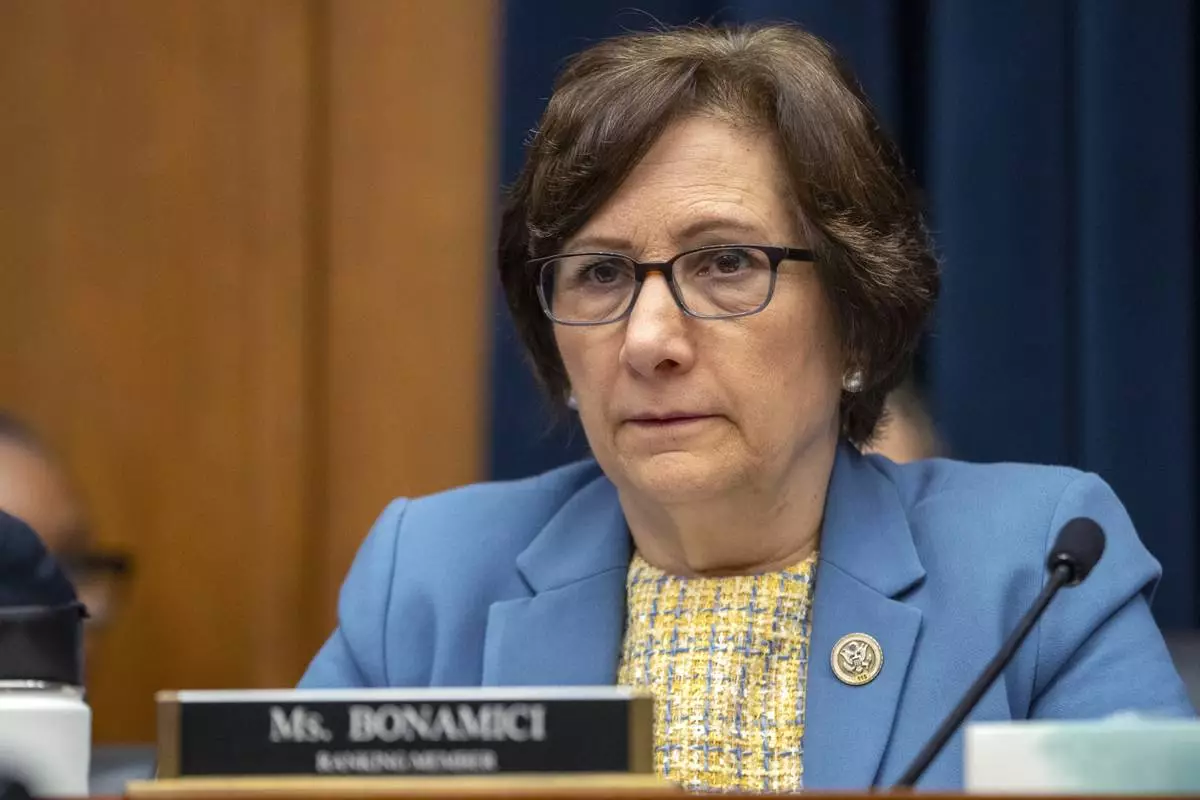
Rep. Suzanne Bonamici, D-Ore., ranking member of the House Subcommittee on Early Childhood, Elementary, and Secondary Education, attends a hearing on antisemitism in K-12 public schools, Wednesday, May 8, 2024, on Capitol Hill in Washington. (AP Photo/Jacquelyn Martin)

David Banks, chancellor of New York Public schools, answers a question during a House Subcommittee on Early Childhood, Elementary, and Secondary Education hearing on antisemitism in K-12 public schools, Wednesday, May 8, 2024, on Capitol Hill in Washington. (AP Photo/Jacquelyn Martin)

A woman wearing a Star of David necklace attends a hearing on antisemitism in K-12 public schools, by the Subcommittee on Early Childhood, Elementary, and Secondary Education, Wednesday, May 8, 2024, on Capitol Hill in Washington. (AP Photo/Jacquelyn Martin)
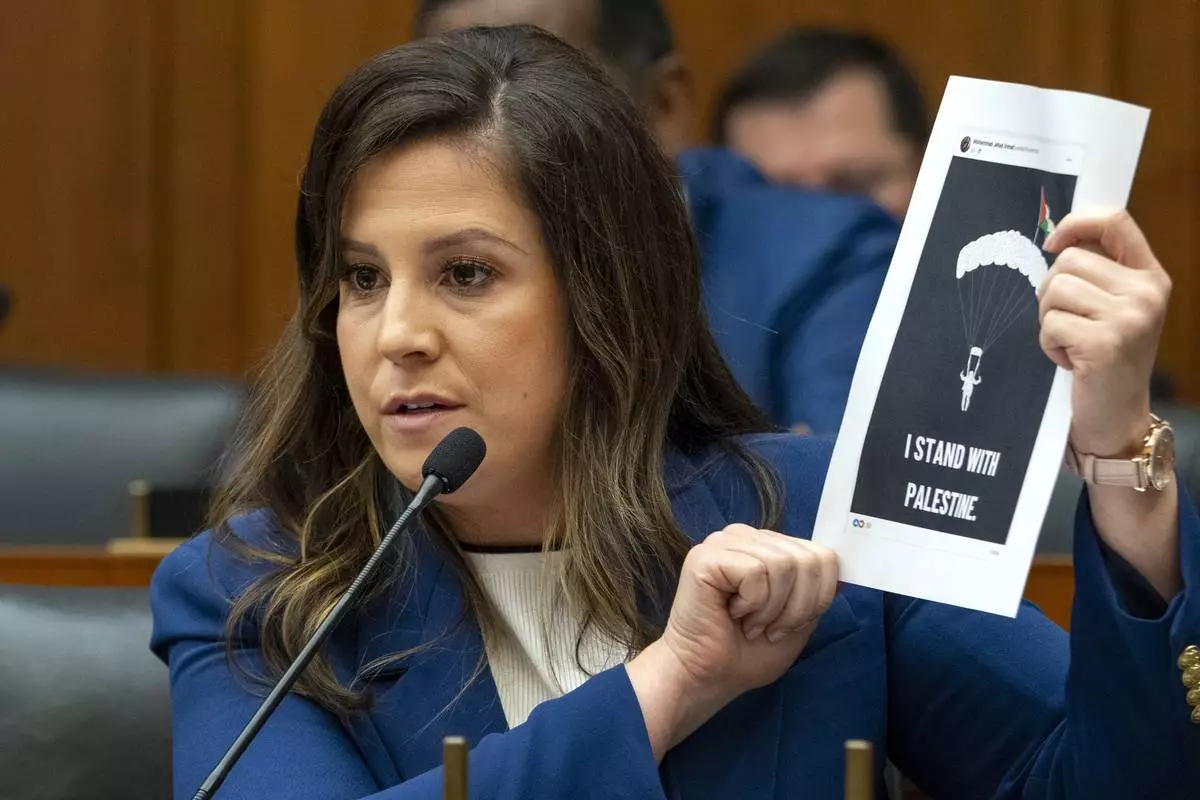
Rep. Elise Stefanik, R-N.Y., hołds up a printout that she claims was from a New York City public school teacher's social media account, during a Subcommittee on Early Childhood, Elementary, and Secondary Education hearing on antisemitism in K-12 public schools, Wednesday, May 8, 2024, on Capitol Hill in Washington. (AP Photo/Jacquelyn Martin)
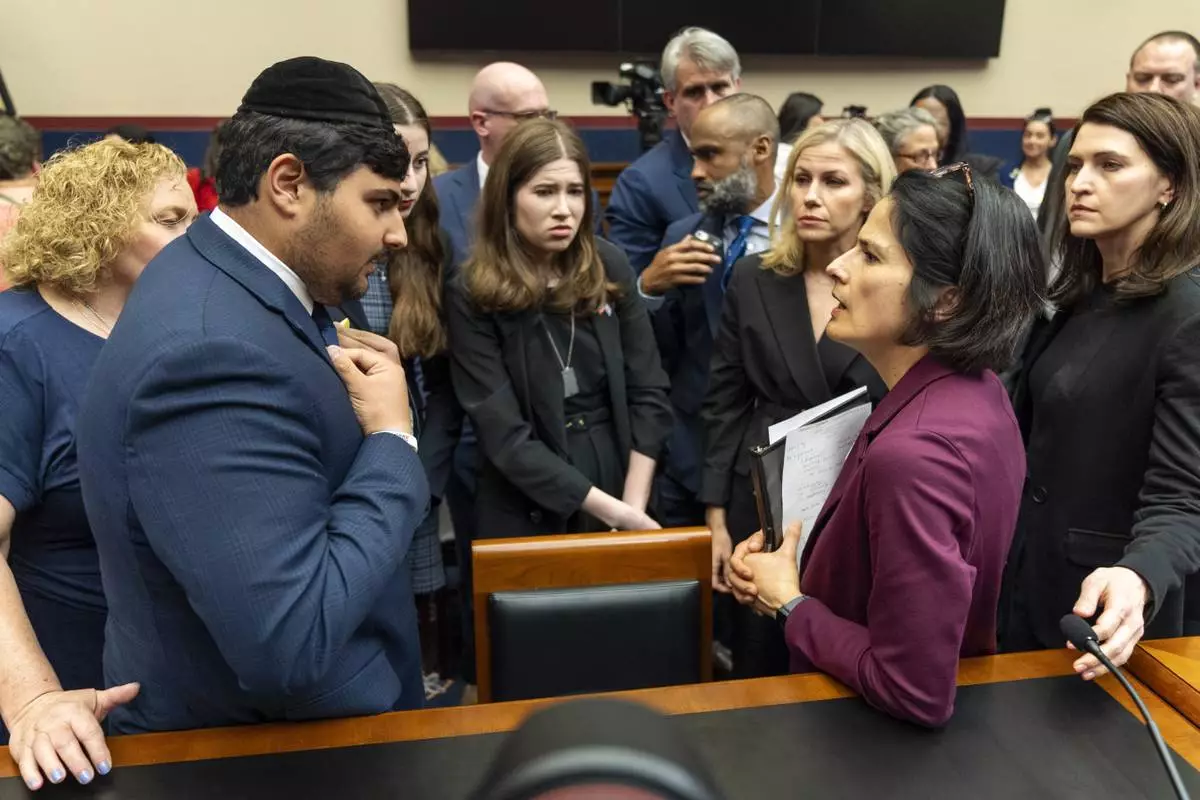
Kobie Talmoud, 16, left, a student at John F. Kennedy High School in Silver Spring, Md., speaks with Karla Silvestre, President of the Montgomery Count (Md.) Board of Education, after a hearing on antisemitism in K-12 public schools, by the Subcommittee on Early Childhood, Elementary, and Secondary Education, Wednesday, May 8, 2024, on Capitol Hill in Washington. (AP Photo/Jacquelyn Martin)
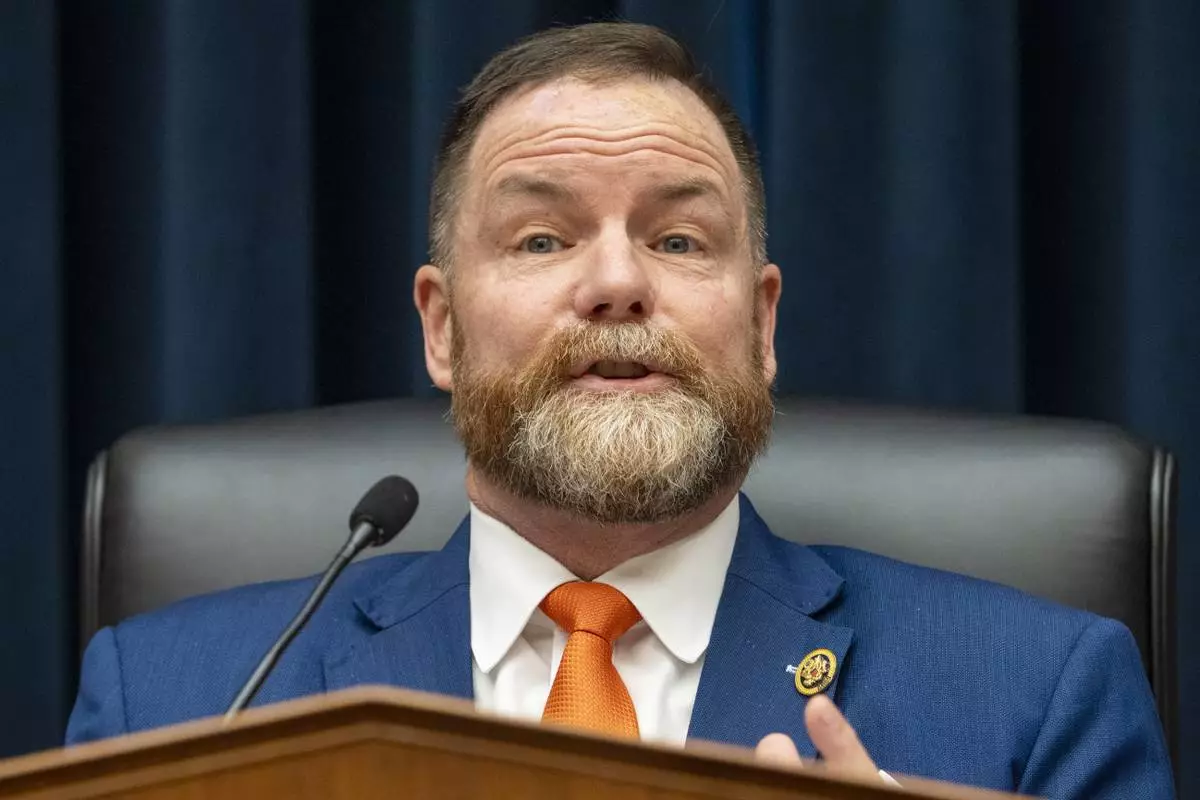
Rep. Aaron Bean, R-Fla., Chair of the House Subcommittee on Early Childhood, Elementary, and Secondary Education, speaks during a hearing on antisemitism in K-12 public schools, Wednesday, May 8, 2024, on Capitol Hill in Washington. (AP Photo/Jacquelyn Martin)

Enikia Ford Morthel, Superintendent of the Berkeley United School District, speaks during a hearing on antisemitism in K-12 public schools, with the House Subcommittee on Early Childhood, Elementary, and Secondary Education, Wednesday, May 8, 2024, on Capitol Hill in Washington. (AP Photo/Jacquelyn Martin)
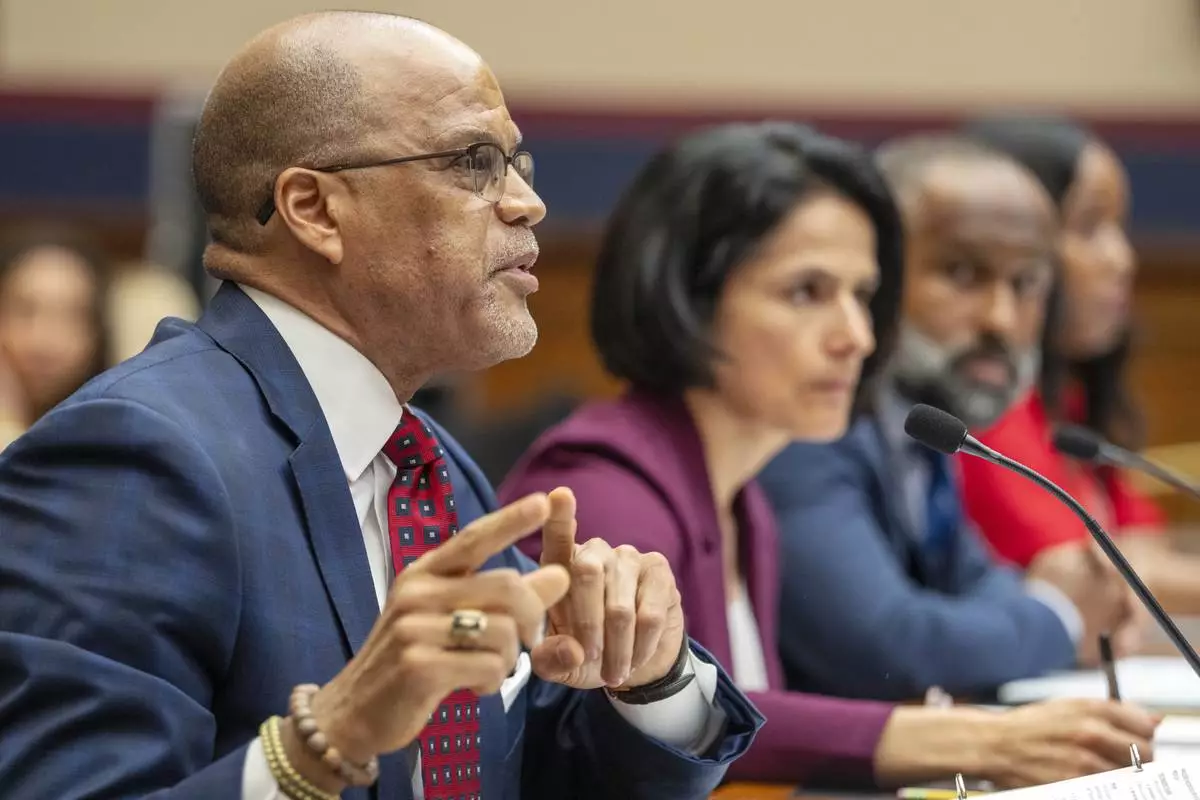
From left, David Banks, chancellor of New York Public schools, speaks next to Karla Silvestre, President of the Montgomery Count (Md.) Board of Education, Emerson Sykes, Staff Attorney with the ACLU, and Enikia Ford Morthel, Superintendent of the Berkeley United School District, during a hearing on antisemitism in K-12 public schools, at the House Subcommittee on Early Childhood, Elementary, and Secondary Education, Wednesday, May 8, 2024, on Capitol Hill in Washington. (AP Photo/Jacquelyn Martin)

David Banks, the Chancellor of New York Public Schools, answers a question during a Subcommittee on Early Childhood, Elementary, and Secondary Education hearing on antisemitism in K-12 public schools, Wednesday, May 8, 2024, on Capitol Hill in Washington. (AP Photo/Jacquelyn Martin)
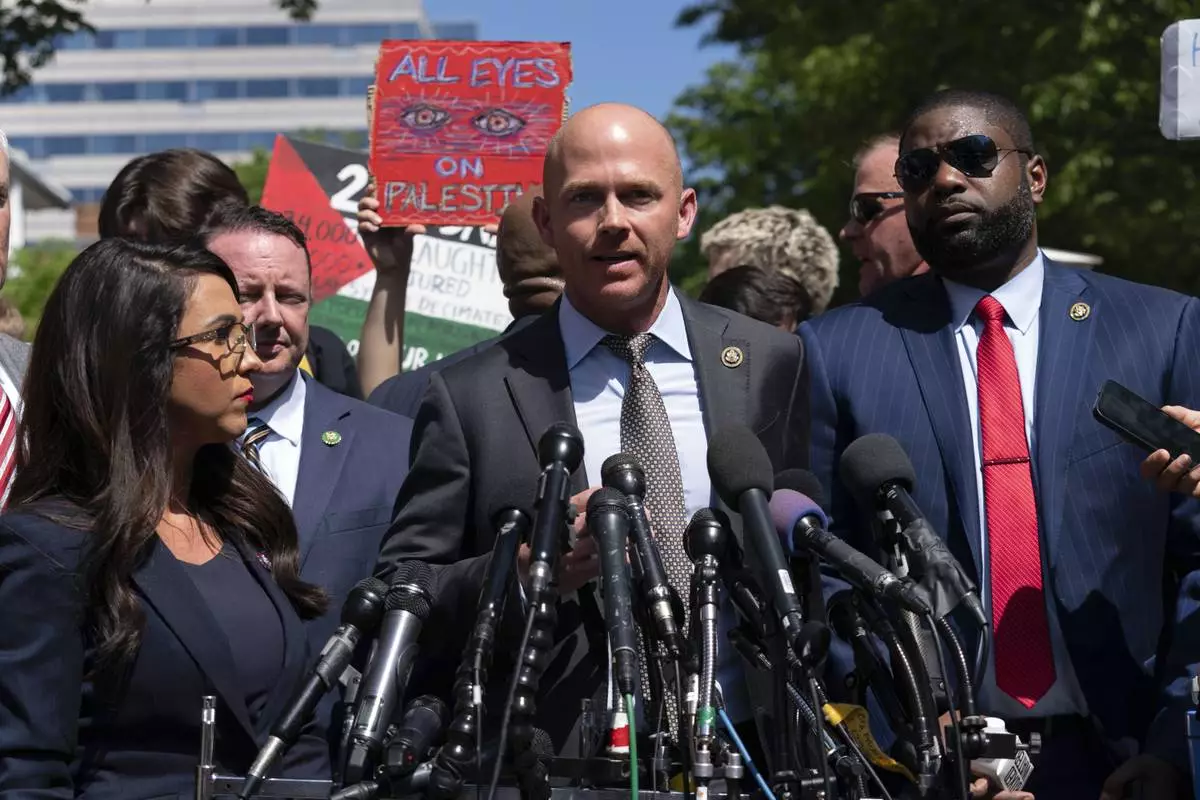
Rep. William Timmons, R-S.C., accompanied other members of Congress speaks to the media after they toured the George Washington University students encampment as they protest over the Israel-Hamas war on Wednesday, May 1, 2024, in Washington. (AP Photo/Jose Luis Magana)














